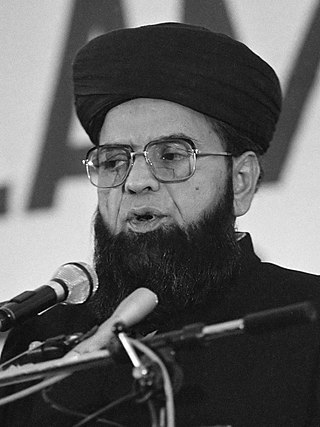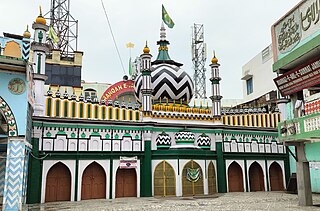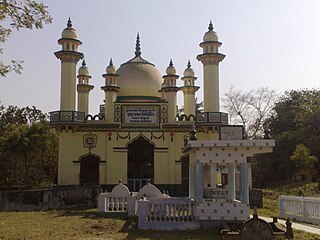
Islam constitutes the third largest religion in Singapore, with Muslims accounting for approximately 15.6% of the population, as indicated by the 2020 census. Predominantly, Singaporean Muslims are Sunni Muslims adhering to either the Shafi‘i or Hanafi schools of thought. The majority of the Muslim population, about 80%, are ethnic Malays, while 13% are of Indian descent. The remaining fraction comprises local Chinese, Eurasian, and Arab communities, in addition to foreign migrants. Buddhism and Christianity are the two larger religious affiliations in the country.

The Barelvi movement, also known as Ahl al-Sunnah wal-Jama'ah is a Sunni revivalist movement that generally adheres to the Hanafi and Shafi'i schools of jurisprudence, the Maturidi and Ash'ari creeds, a variety of Sufi orders, including the Qadiri, Chishti, Naqshbandi and Suhrawardi orders, as well as many other orders of Sufism, and has hundreds of millions of followers across the world. They consider themselves to be the continuation of Sunni Islamic orthodoxy before the rise of Salafism and the Deobandi movement.

Ahmed Raza Khan Barelvi, known reverentially as A'la Hazrat, was an Indian Islamic scholar and poet who is considered as the founder of the Barelvi movement.

Shah Ahmad Noorani Siddiqi was a Pakistani Islamic scholar, mystic, philosopher, revivalist and politician.
The Abdul Aleem Siddique Mosque is a mosque in Singapore that was built as a recognition of Muhammad Abdul Aleem Siddiqi’s propagation of Islam.

Qamaruzzaman Azmi, also known as Allama Azmi, is an Indian Islamic scholar, philosopher and speaker. He is president of the World Islamic Mission. From 2011 to 2021, he was listed in The 500 Most Influential Muslims in the world by the Royal Aal al-Bayt Institute for Islamic Thought due to his efforts to build organisations and institutions, mosques, colleges, and universities for over five decades. He is the patron in chief of Sunni Dawat-e-Islami, an Islamic movement having branches around the world.

Akhundzada Mohammad Abdul Ghafoor Hazarvi was a Muslim theologian, jurist, and scholar of ahadith in Pakistan. He was active in the Pakistan movement, and served as a member of Council of Islamic Ideology. He was the companion of Pakistan's founder Muhammad Ali Jinnah and Maulana Zafar Ali Khan and was active in the independence movement of Pakistan against the British Raj. He was a Sufi of the Chishti Sufi order and the founding member of the religious Barelvi Sunni strain political party Jamiat Ulema-e-Pakistan (JUP). He became its president in 1948. He was also a political figure in Pakistan and was the first recipient of Nishan-e-Imtiaz by the President of Pakistan. He was also the chairman of Majlis-e-Tahaffuz-e-Khatme Nabuwwat, an organisation opposed to the Ahmadiyya Movement that waged a campaign against Mirza Ghulam Ahmed's claim of prophethood.

Muhammad Muslehuddin Siddiqui, was a preacher born in Nanded on India's Deccan Plateau. He belonged to the Barelvi movement of Sunni Islam and a mureed of Amjad Ali Aazmi.

Idris Kandhlawi was a Pakistani Sunni scholar during the mid-twentieth century, widely recognized for his contributions to various fields of Islamic studies, including hadith, Quranic studies, Islamic jurisprudence, Prophetic biography, and theology. Holding the titles of Sheikh al-Hadith and Sheikh al-Tafsir, he traced his lineage to Abu Bakr on his father's side and Umar on his mother's side. He studied in Thana Bhawan under Ashraf Ali Thanwi. He studied hadith, first at Mazahir Uloom under Khalil Ahmad Saharanpuri, and later at Darul Uloom Deoband under Anwar Shah Kashmiri. He started his professional career at Madrasa Aminia and later went to Darul Uloom Deoband. In 1929 he took a position in Hyderabad State, where he had access to the Asafia Library. This experience enabled him to produce a five-volume Arabic commentary on Mishkat al-Masabih titled Al-Taleeq al-Sabeeh, of which the first four volumes were published in Damascus. His scholarly work garnered recognition in the Arab world. He later assumed the roles of Sheikh al-Tafsir at Darul Uloom Deoband and Sheikh al-Hadith wa al-Tafsir at Jamia Ashrafia. In addition, he served as the Chancellor of Islamia University of Bahawalpur during its tenure as Jamia Abbasia.
Muhammad Fazlur Rahman Ansari was a Pakistani Islamic scholar and philosopher.

Mustafa Raza Khan Qadri (1892–1981), was an Indian Sunni Muslim scholar and author, and leader of the Sunni Barelvi movement following the death of its founder, his father Ahmed Raza Khan. He was known as Mufti-Azam-i-Hind to his followers. He is widely known as Mufti-e-Azam-e-Hind. On his death date his follower celebrate Urs name as Urs-e-Noori on every 14th Muharram of Islamic Year.

Abd al-Ḥāmid al-Qādirī al-Badāyūnī, also known as Mujahid-e-Millat, was a Pakistani Islamic scholar, Sufi, poet, and leader from Pakistan. He was the founder of the Islamic college Jamia-Talimat-e-Islamiya located in Karachi.
Shah Turab ul Haq Qadri was a Sunni Muslim scholar, preacher and politician from Hyderabad who represented the Sufi Barelvi movement in Karachi, Pakistan. He was the main leader of Jamaat Ahle Sunnat, a Sunni organisation in Pakistan.

Muhammad Waqaruddin Qadri also known as Waqar-e-Millat was an Islamic scholar associated with the Sunni Barelvi movement of south Asia. His fatawa (rulings) are compiled in three volume of the book titled Waqar ul Fatawa. He taught and administered in Islamic institutes in India, Bangladesh and later in Pakistan. He was conferred title of Grand Mufti of Pakistan during Muhammad Zia-ul-Haq regime.

Moḥammad Abū Bakr Ṣiddīque was a Bengali Islamic scholar and the inaugural Pir of Furfura Sharif in West Bengal. He is regarded by his followers, who are scattered across eastern India and Bangladesh, as a mujaddid (reviver) of Islam in the region, due to his significant contributions in religious propagation via the establishment of mosques and madrasas, publication of newspapers and education development in neglected areas. He was the founding president of the sociopolitical Anjuman-i-Wazin-i-Bangla organisation, which advocated for causes such as the Khilafat Movement and Pakistan Movement. Siddique died in 1943, and his shrine is greatly venerated as one of West Bengal's most prominent Sufi centres.

Muhammad Ibrahim Raza Khan Qadri Razvi (1907–1965), commonly known as Mufassir-e-Azam-e-Hind and Jilani Miyan, was an Indian Islamic scholar, Sufi mystic, orator, author, and leader of Sunni Muslim’s Barelvi movement of Sunni Islam in the Indian subcontinent. He was the elder brother of Hammad Raza Khan.
Jamiyah Singapore is a Non-governmental organisation based in Singapore which belongs to the Barelvi movement of Sunni Islam. It was established and founded by Muhammad Abdul Aleem Siddiqi Al-Qaderi, a student of Ahmed Raza Khan Barelvi in 1932 after sharing ideas with Amjad Ali Aazmi and Mustafa Raza Khan Qadri. It was established to promote and preach Islam in Singapore.
Muhammad Hashmat Ali Khan Qadri Lucknowi popularly known as Sher Beesha-e-Ahle Sunnat or Munazir-e-Ahle Sunnat was an Indian Islamic scholar, cleric, author and writer belonging to the Barelvi movement of Sunni Islam. He was the spiritual successor of Ahmed Raza Khan Barelvi in the Qadiriyya-Razaviyya order of Sufism. He was against the ideology of Muhammad Ali Jinnah and he had written a book against the Two-nation theory which is still banned in Pakistan.










